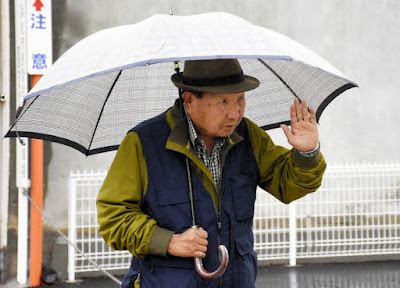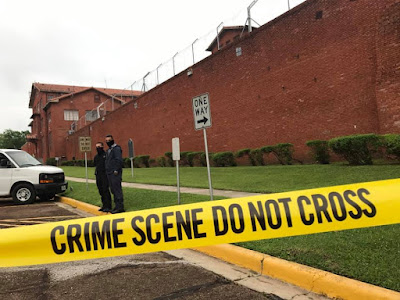Georgia prosecutors have long had a reputation for zealously seeking the death penalty to punish heinous killers. And yet capital punishment in 2019 seems to be going the way of the guillotine and the gallows: It’s disappearing.
A jury in Augusta imposed the last death sentence in Georgia in March 2014. With no capital trials set for early this year, it’s all but certain the state will go at least five years without a death sentence.
That span is the longest here since the U.S. Supreme Court reinstated capital punishment more than four decades ago. It wasn’t long ago when death sentences were fairly routine in the state. Between 2007 and 2014, for example, prosecutors convinced Georgia juries to hand down death sentences in 18 cases.
Pursuing a death penalty means a costly trial and decades of appeals. And it’s now made more difficult by jurors’ growing reluctance to send convicts to their death. The availability of a life-without-parole sentence, which is seen by many as a more humane option, offers an alternative that district attorneys are turning to more often.
Last year, Georgia’s district attorneys filed notices to seek the death penalty in just three cases. That’s also the lowest number, on an annual basis, in decades. It wasn’t that long ago when DAs sought death for dozens of cases a year, such as in 2011 when they sought it 26 times or 2005 when they sought it 40 times, according to state records obtained by The Atlanta Journal-Constitution under an Open Records Act request.
“Wow, I didn’t know that,” Cobb County District Attorney Vic Reynolds said, when told so few death notices were filed last year. He attributed the precipitous drop to the ability of prosecutors to get sentences of life in prison without the possibility of parole.
This is also reflected on a national level. Across the U.S., capital sentences are reaching historic lows. Polls have shown increasing support for life-without-parole sentences as opposed to the death penalty.
Last year, 42 death sentences were imposed nationwide, according to the Death Penalty Information Center in Washington. That’s down from 83 such sentences in 2013 and 120 in 2008.
A decade ago, prosecutors in Georgia had to seek the death penalty against a murder defendant in order to get the option of a life-without-parole sentence. But in 2009 state lawmakers made a change that allows DAs to seek life without parole in non-death-penalty cases. In Georgia, a sentence of life in prison means an inmate can seek parole after serving just 30 years — a life-without-parole sentence is the only way to be sure someone convicted stays in prison.
In the Cobb County hot-car death case involving a toddler, Reynolds did not seek death for the child’s father, Justin Ross Harris. Instead, Reynolds obtained a life-without-parole sentence after Harris’s conviction.
“The majority of prosecutors around the state are now convinced that a life-without-parole sentence actually means what it says,” said Reynolds, who has sought the death penalty in one case during his six years as DA. “It’s made a huge difference.”
Reynolds also acknowledged that the public’s attitude toward capital punishment has shifted. “It’s now more difficult to obtain a death sentence because that’s not necessarily what many of your citizens or jurors wish to be done these days,” he noted.
Vernon Keenan, who retired Jan. 1 after serving 15 years as GBI director, said he doesn’t believe the death penalty will be around much longer.
“I believe at some point it will go away,” he said. “It will either be abolished by law or no longer used because the public no longer supports it.”
The state’s former top law man said he’s never supported capital punishment.
“It doesn’t accomplish much of anything,” Keenan said. “It doesn’t deter anyone from committing the crime. They’re not concerned about the sentence because they don’t think they’ll get caught.”
2018’s death-penalty cases
Two of the three cases where DAs sought death last year involved twin killings.
In March, Pierce County District Attorney George Barnhill announced he was seeking death against Kenneth Jernigan for the Dec. 10, 2017, deaths of Dan and Flora Hollman in the southeastern Georgia town of Patterson. Jernigan allegedly killed the elderly couple by beating their heads with a stick or a metal object during a burglary, according to court records. Jernigan, who had prior armed robbery convictions, is also accused of setting fire to the Hollman’s residence before leaving with about $40 in cash.
The Hollmans, who were semi-retired farmers, “were well liked and respected elders in their community, never broke the law, both giving, sweet and generous people,” Barnhill said.
“We have the death penalty as an option in Georgia,” the DA said. “It is a legal and appropriate sentence where the evidence supports it and the proven acts of the accused demand it. I decided it is appropriate to seek in this case.”
Another death-penalty case is against James L. Smith is charged with the fatal shootings of 31-year-old Shawna Ware and 33-year-old Sheena Jones in Cordele. When authorities tracked down Smith to arrest him at a hotel, Smith opened fire on the officers before finally surrendering, police said.
The third case is against Leon Lamar Tripp, who is charged with killing his 16-year-old stepdaughter in Augusta. The girl’s remains were found in a shallow grave in March.
Whether those three cases go to trial remains to be seen. The state Office of the Capital Defender, which represents almost everyone facing a death-penalty prosecution in Georgia, has closed 69 cases since the beginning of 2015. Most of the resolutions involved defendants who pleaded guilty in exchange for sentences of life without parole.
Because the capital defender’s office has developed a good rapport with district attorneys, both sides are now able to sit down and find common ground, said Pete Skandalakis, executive director of the Prosecuting Attorneys’ Council of Georgia.
“That office has become real good at identifying mitigating factors for a defendant and talking about that with prosecutors long before lines are drawn in the sand,” Skandalakis said, referring to a point when DAs will no longer negotiate a plea deal. “This has made a real difference, and you save the resources and the time required of a death-penalty case and the victims don’t have to go through the years-long process.”
Of the 69 closed cases, only five went to trial. In those, juries declined to return a death sentence in all of them. Three of these cases involved the fatal shootings of police officers and resulted in sentences of life without parole.
“From what I’m hearing from jurors, there are a lot of people who believe life without parole is as harsh, if not more harsh, a punishment than the death penalty,” said Jerry Word, who heads the state capital defender office.
Georgia’s Death Row
About 50 defendants in Georgia now face death-penalty prosecutions, and some are scheduled to stand trial in the coming months.
Among them is Ricky Dubose, one of two inmates accused of killing two state correctional guards during a prison bus escape in June 2017. Because of pretrial publicity, the case will be tried in Brunswick on Sept. 30.
And Tiffany Moss, who is acting as her own attorney, is now tentatively scheduled to face a death-penalty trial in Gwinnett County in April. Moss is accused of starving her 10-year-old stepdaughter to death in 2013.
As this unfolds, the state is soon expected to start setting execution dates for death-row inmates whose appeals are all but exhausted.
In December, the U.S. Supreme Court declined to hear the appeal of Ray Cromartie, who sits on death row for the April 1994 fatal shooting of a convenience store clerk during an armed robbery in Thomasville. On Monday, by a 6-3 vote, the high court also declined to hear the appeal of Donnie Lance, who was sentenced to death for the November 1997 killings of his ex-girlfriend and her new boyfriend in Jackson County. In a rigorous dissent, Justice Sonia Sotomayor said Lance’s trial lawyers “failed even to look into, much less to put on, a case for sparing Lance’s life.”
The fact so few death sentences are being imposed now in Georgia also points to the difference competent defense lawyers can make, said Stephen Bright, a law professor at Georgia State, Georgetown and Yale law schools.
“Those are people who were sentenced to death some time ago often with lawyers who were not qualified to try a death-penalty case,” Bright said of the inmates about to receive execution dates. “They are also people who would not be sentenced to death today.”
Source: ajc.com, Bill Rankin, January 11, 2019
⚑ | Report an error, an omission, a typo; suggest a story or a new angle to an existing story; submit a piece, a comment; recommend a resource; contact the webmaster, contact us:
deathpenaltynews@gmail.com.
Opposed to Capital Punishment? Help us keep this blog up and running! DONATE!
"One is absolutely sickened, not by the crimes that the wicked have committed,
but by the punishments that the good have inflicted." -- Oscar Wilde












